15 years one-stop China custom CNC machining parts factory
 146 |
Published by VMT at Jan 06 2025 | Reading Time:About 5 minutes
146 |
Published by VMT at Jan 06 2025 | Reading Time:About 5 minutes
In the competitive realm of CNC machining parts manufacturing, selecting the right material is paramount to ensuring product performance, durability, and cost-effectiveness. Manufacturers often face the dilemma of choosing between Polyoxymethylene (POM) and Delrin, two widely used engineering plastics renowned for their exceptional properties. This decision can significantly impact the quality and longevity of the machined components, leading to potential setbacks in production efficiency and increased costs if not made correctly. Understanding the nuanced differences between POM and Delrin is essential for making informed material choices that align with specific application requirements and manufacturing goals.
Polyoxymethylene and Delrin are two leading engineering plastics used in CNC machining, each offering distinct properties that cater to different manufacturing needs. Understanding their differences is crucial for selecting the optimal material for your CNC machined parts.
Choosing the appropriate material is a critical step in the CNC machining manufacturing process. To determine whether Polyoxymethylene or Delrin is the better fit for your project, it is essential to explore their respective compositions, properties, and applications. This comprehensive guide delves into the intricacies of POM and Delrin, providing manufacturers with the knowledge needed to make strategic decisions that enhance the performance and quality of their CNC machined parts.
Introduction
In the landscape of CNC machining parts manufacturing, the selection of materials plays a pivotal role in determining the success of a project. Polyoxymethylene (POM) and Delrin are two engineering plastics that frequently emerge as top contenders due to their superior mechanical and physical properties. Both materials offer high strength, excellent dimensional stability, and low friction, making them ideal for precision machined components. However, despite their similarities, POM and Delrin possess unique characteristics that cater to different applications and performance requirements. This article aims to elucidate the differences between Polyoxymethylene and Delrin, helping manufacturers choose the most suitable material for their specific CNC machining needs.
Polyoxymethylene (POM), commonly known by its brand name Delrin, is a high-performance engineering thermoplastic belonging to the acetal family. POM is celebrated for its exceptional mechanical properties, including high stiffness, strength, and excellent wear resistance. These attributes make it an ideal choice for precision parts that require tight tolerances and long-term durability. POM is inherently resistant to solvents, fuels, and a wide range of chemicals, which broadens its applicability across various industries such as automotive, electronics, and consumer goods.
In CNC machining parts manufacturing, POM's machinability is highly valued. It allows for the production of complex geometries with minimal tool wear and excellent surface finishes. Additionally, POM's low moisture absorption ensures that machined parts maintain their dimensional stability in varying environmental conditions, reducing the risk of warping or degradation over time. The versatility of POM also extends to its ability to be easily bonded or welded, facilitating the creation of multi-component assemblies without compromising structural integrity. Overall, Polyoxymethylene stands out as a reliable and efficient material for high-precision CNC machined parts that demand both performance and longevity.
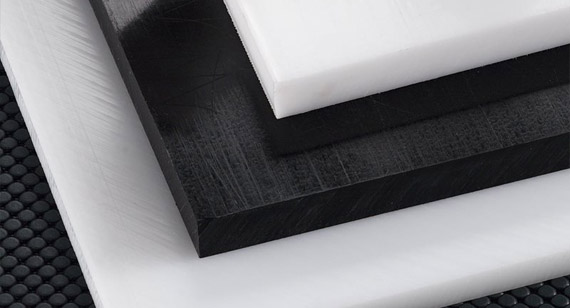
Acetal, another name for Polyoxymethylene, encompasses a range of properties that make it a superior choice for various CNC machining applications. These properties are integral to understanding why Acetal is favored in precision engineering and manufacturing sectors.
Recyclable, Liquefies at Approximately 162°C to 175°C
One of the standout features of Acetal is its recyclability, aligning with sustainable manufacturing practices. Acetal can be reprocessed multiple times without significant degradation of its mechanical properties, making it an environmentally friendly option. Additionally, Acetal’s melting point ranges from approximately 162°C to 175°C, allowing it to withstand high-temperature processes during CNC machining without losing structural integrity. This thermal stability ensures that Acetal parts maintain their shape and functionality even in applications exposed to elevated temperatures.
Excellent Heat Resistance
Acetal exhibits excellent heat resistance, enabling it to perform reliably in environments with fluctuating temperatures. This property is crucial for CNC machined parts used in automotive engines, electrical components, and other high-heat applications. The material’s ability to resist deformation and maintain mechanical strength under thermal stress ensures consistent performance and longevity of the machined parts.
High Resistivity
Acetal's high electrical resistivity makes it an excellent choice for applications requiring electrical insulation. CNC machined parts made from Acetal can effectively prevent electrical conduction, enhancing the safety and reliability of electronic assemblies and devices. This property is particularly beneficial in the electronics and telecommunications industries, where precise and secure insulation is essential.
Low Water Absorption
With low water absorption rates, Acetal ensures that CNC machined parts remain dimensionally stable in humid or wet environments. This resistance to moisture prevents swelling, warping, and other forms of degradation that can compromise the functionality and precision of machined components. As a result, Acetal is ideal for use in outdoor applications, automotive parts, and consumer goods that may be exposed to varying levels of humidity and moisture.
Low Coefficient of Friction
Acetal’s low coefficient of friction is another advantageous property, reducing wear and tear in moving parts. This characteristic is particularly beneficial for CNC machined components such as gears, bearings, and bushings, where smooth and consistent movement is critical. The reduced friction minimizes energy loss and enhances the efficiency and lifespan of the parts, making Acetal a preferred material in applications requiring high-performance motion.
High Strength, High Stiffness
Acetal boasts high strength and stiffness, providing the necessary rigidity and durability for demanding CNC machining applications. These mechanical properties ensure that machined parts can withstand significant loads and stresses without deforming or failing. High strength and stiffness also contribute to the precision and accuracy of machined components, maintaining tight tolerances and consistent performance over time.
Polyoxymethylene (POM) is available in various forms, each tailored to specific manufacturing needs and performance requirements. Understanding the different types of POM is essential for selecting the right material for CNC machining parts, ensuring optimal performance and durability.
Polyoxymethylene Copolymer (POM-C)
Polyoxymethylene Copolymer (POM-C) is a variant of POM that includes comonomers such as methyl methacrylate or ethylene oxide. This modification enhances the material’s toughness and impact resistance compared to homopolymer variants. POM-C is particularly suitable for applications requiring higher durability and flexibility, making it ideal for automotive parts, electrical components, and consumer goods that undergo frequent stress and impact.
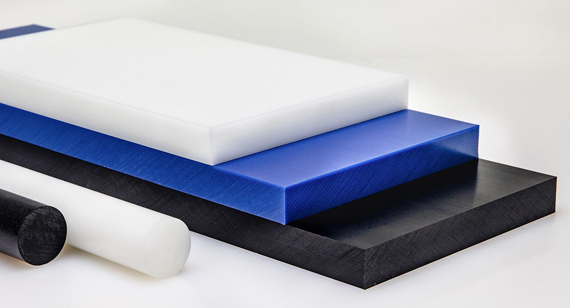
Polyoxymethylene Homopolymer (POM-H)
Polyoxymethylene Homopolymer (POM-H) is the pure form of POM, consisting solely of repeating units of formaldehyde. POM-H offers superior dimensional stability, higher crystallinity, and better mechanical properties compared to its copolymer counterpart. This makes POM-H ideal for high-precision CNC machining parts such as gears, bearings, and intricate mechanical assemblies that demand tight tolerances and consistent performance under varying conditions.
Delrin, a brand name owned by DuPont, is synonymous with high-quality Polyoxymethylene (POM) used in engineering applications. Delrin is renowned for its exceptional balance of strength, stiffness, and machinability, making it a popular choice for CNC machining parts across various industries. Delrin offers outstanding dimensional stability and low moisture absorption, ensuring that machined components maintain their precision and functionality over time. Additionally, Delrin’s excellent wear resistance and low friction properties enhance the performance and longevity of moving parts such as gears, bearings, and bushings. The material’s versatility and reliability make Delrin a preferred option for manufacturers seeking high-performance, durable, and precise CNC machined parts that meet the stringent demands of modern engineering applications.
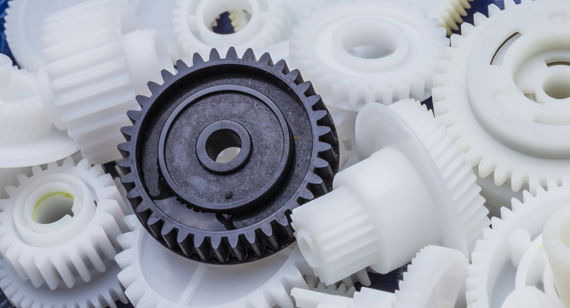
Delrin, a premium grade of Polyoxymethylene (POM), is engineered to provide superior properties that enhance the performance of CNC machined parts. Understanding the specific attributes of Delrin is essential for leveraging its benefits in various manufacturing applications.
Low Density Center or Centerline Porosity
Delrin exhibits low density with minimal center or centerline porosity, ensuring uniform strength and structural integrity throughout the material. This property is crucial for CNC machined parts that require consistent mechanical performance and reliability, as it prevents weak points and ensures that the parts can withstand operational stresses without failure.
Chemical Resistance
Delrin offers excellent chemical resistance, making it highly resistant to a wide range of solvents, fuels, and chemicals. This resistance ensures that CNC machined parts remain unaffected by exposure to harsh substances, enhancing their durability and lifespan in demanding environments such as automotive fuel systems, chemical processing equipment, and industrial machinery.
High Stiffness and High Flexural Modulus at Room and Elevated Temperatures
Delrin maintains high stiffness and a high flexural modulus both at room temperature and elevated temperatures, providing the necessary rigidity and strength for CNC machined components. This ensures that Delrin parts can perform reliably under varying thermal conditions without losing their structural integrity or dimensional stability, making them suitable for applications in automotive engines, electrical housings, and high-performance machinery.
High Tensile and Impact Strength
Delrin possesses high tensile strength and impact resistance, allowing CNC machined parts to endure significant mechanical stresses and impacts without deforming or breaking. This makes Delrin an ideal choice for components such as gears, connectors, and structural assemblies that require robust performance and durability in high-stress applications.
Tough with Low Coefficient of Friction
Delrin combines toughness with a low coefficient of friction, reducing wear and tear in moving parts and enhancing the efficiency of mechanical systems. This property is particularly beneficial for CNC machined components like bearings, bushings, and sliding parts, where smooth and consistent movement is essential for optimal performance and longevity.
High Creep Resistance
Delrin exhibits high creep resistance, maintaining its shape and dimensional stability under sustained loads over extended periods. This ensures that CNC machined parts made from Delrin retain their precision and functionality, even when subjected to continuous stress, making them suitable for applications in automotive, aerospace, and industrial machinery where long-term reliability is crucial.
High Flow
Delrin has excellent flow characteristics, facilitating the creation of intricate and complex shapes during CNC machining processes. This property allows for the production of detailed and precise components, enabling manufacturers to achieve high levels of accuracy and complexity in their machined parts without compromising the material’s mechanical properties.
Recyclable
Delrin is fully recyclable, supporting sustainable manufacturing practices and reducing environmental impact. The ability to recycle Delrin without significant loss of quality makes it an environmentally responsible choice for CNC machining parts manufacturing, aligning with global sustainability goals and reducing the reliance on virgin materials.
High Resistivity
Delrin possesses high electrical resistivity, making it an excellent choice for electrical insulation applications. CNC machined parts made from Delrin can effectively prevent electrical conduction, enhancing the safety and reliability of electronic assemblies and devices. This property is particularly beneficial in the electronics and telecommunications industries, where precise and secure insulation is essential.
Delrin is available in various grades, each designed to cater to specific performance requirements and applications in CNC machining parts manufacturing. Understanding the different grades of Delrin is essential for selecting the appropriate material that aligns with the desired properties and functionality of the machined components.
Common Grades:
Delrin 150
Delrin 150 is a standard grade known for its excellent balance of strength, stiffness, and machinability. It is widely used in applications requiring high precision and durability, such as gears, bearings, and mechanical assemblies. Delrin 150 offers good chemical resistance and low friction, making it suitable for a variety of industrial and consumer applications where reliability and performance are paramount.

Delrin AF 100 (13% PTFE Filled)
Delrin AF 100 is a modified grade that includes 13% Polytetrafluoroethylene (PTFE) filler. This addition significantly enhances the material’s low friction properties, making it ideal for applications involving sliding or moving parts. Delrin AF 100 is commonly used in components such as bushings, seals, and sliding mechanisms, where reduced friction and wear are essential for optimal performance and longevity.
Delrin (30% Glass Filled)
Delrin with 30% glass filling is engineered to provide enhanced mechanical strength and rigidity. The glass fibers reinforce the polymer matrix, increasing the material’s stiffness, dimensional stability, and resistance to deformation under load. This grade is ideal for high-stress applications requiring superior strength and durability, such as structural components, heavy-duty gears, and load-bearing assemblies in CNC machined parts.
Delrin AF DE588
Delrin AF DE588 is a specialized grade that combines the high-performance characteristics of standard Delrin with additional PTFE fillers for improved wear resistance and lower friction. This grade is particularly suitable for high-precision and high-speed applications where minimizing friction and wear is critical for maintaining performance and extending the lifespan of machined parts. Delrin AF DE588 is commonly used in advanced automotive components, precision engineering parts, and high-performance industrial machinery.
Delrin and Acetal are terms often used interchangeably in the engineering plastics industry, leading to some confusion among manufacturers and engineers. While they share many similarities, understanding whether Delrin and Acetal are the same material is crucial for making informed decisions in CNC machining parts manufacturing.
Understanding the Terms
Delrin is a brand name owned by DuPont, referring specifically to their line of high-performance Polyoxymethylene (POM) products. Acetal, on the other hand, is a generic term for a class of polymers within the POM family, encompassing both homopolymer and copolymer variants. Essentially, Delrin is a specific type of Acetal, renowned for its consistent quality and performance as engineered by DuPont.
Key Differences and Similarities
While Delrin and Acetal share the same chemical backbone, the key differences lie in their formulations and proprietary enhancements. Delrin products are engineered with specific properties tailored for high-performance applications, ensuring uniformity and reliability. Acetal, as a broader category, includes various grades and formulations that may differ in terms of mechanical properties, thermal stability, and chemical resistance based on the manufacturer and intended application.
Conclusion
In summary, Delrin is a premium grade within the Acetal family, offering superior and consistent properties designed for demanding CNC machining applications. While all Delrin is Acetal, not all Acetal is Delrin. Manufacturers should specify Delrin when requiring the highest standards of performance and consistency, whereas Acetal can refer to a broader range of Polyoxymethylene products with varying properties suited to different applications.
Acetal copolymer and Delrin are closely related materials within the Polyoxymethylene (POM) family, but they exhibit distinct differences that affect their suitability for various CNC machining applications. Understanding these differences is essential for selecting the appropriate material that aligns with specific performance requirements and manufacturing goals.
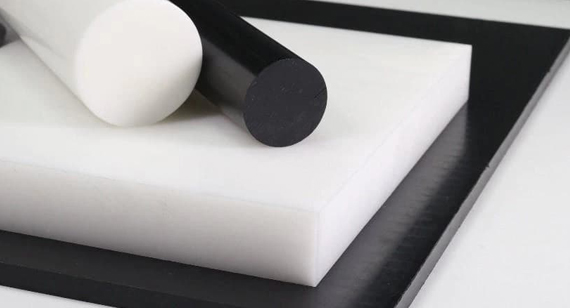
Works
Both Acetal copolymer and Delrin function as high-performance engineering plastics, offering excellent mechanical properties such as high strength, stiffness, and dimensional stability. They are commonly used in precision CNC machining parts where tight tolerances and reliable performance are critical. However, Delrin, being a specific grade of Acetal copolymer, is optimized for enhanced durability and consistency, making it more suitable for demanding applications compared to generic Acetal copolymer grades.
Hardness
Delrin typically exhibits higher hardness compared to standard Acetal copolymer grades. This increased hardness translates to better wear resistance and the ability to withstand higher mechanical stresses, making Delrin ideal for components like gears, bearings, and structural assemblies in CNC machined parts that require long-term durability and minimal wear.
Chemical Resistance
While both materials offer good chemical resistance, Delrin provides superior resistance to a broader range of chemicals and solvents. This makes Delrin more suitable for applications exposed to harsh environments or corrosive substances, such as automotive fuel systems, chemical processing equipment, and industrial machinery parts. Acetal copolymer grades may vary in their chemical resistance based on their specific formulations, so manufacturers should carefully evaluate the chemical exposure in their applications before making a selection.
Temperature Resistance
Delrin generally offers better temperature resistance compared to standard Acetal copolymer. It can maintain its mechanical properties and dimensional stability over a wider temperature range, making it suitable for applications that involve exposure to high or fluctuating temperatures. This enhanced temperature resistance ensures that Delrin machined parts perform reliably under thermal stress without deforming or losing strength.
Flexural Yield Strength and Tensile Strength
Delrin boasts higher flexural yield strength and tensile strength compared to generic Acetal copolymer grades. This means that Delrin can endure greater bending and stretching forces without deforming, making it ideal for high-stress applications where CNC machined parts must maintain their shape and functionality under significant mechanical loads.
Porosity
Delrin typically has lower porosity compared to standard Acetal copolymer grades. Lower porosity results in higher density and improved mechanical properties, enhancing the overall strength and durability of CNC machined parts. Reduced porosity also contributes to better surface finishes and fewer defects, ensuring that Delrin components meet the stringent quality standards required in precision engineering applications.
Applications
Due to its enhanced properties, Delrin is often chosen for high-performance and critical applications in CNC machining parts manufacturing, such as aerospace components, automotive parts, medical devices, and high-precision mechanical assemblies. Acetal copolymer grades may be selected for less demanding applications where the highest levels of performance are not required, offering a cost-effective solution without compromising essential mechanical properties.
Cost
Delrin, being a premium grade of Acetal copolymer, generally comes at a higher cost compared to standard Acetal copolymer grades. However, the investment in Delrin is justified by its superior performance, durability, and reliability, which can lead to longer-lasting CNC machined parts and reduced maintenance costs over time. Manufacturers must weigh the benefits of Delrin against the budget constraints of their projects to determine the most cost-effective material choice.
Choosing between Acetal and Delrin involves evaluating the specific requirements of your CNC machining project, including load demands, friction levels, dimensional stability, chemical exposure, temperature conditions, and budget constraints. Understanding when to select each material ensures that the machined parts meet performance expectations and operational longevity.
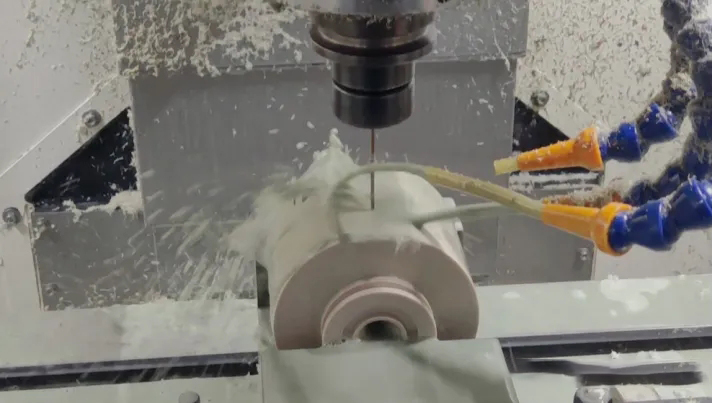
Heavy Loads
When CNC machined parts are subjected to heavy loads and high mechanical stresses, Delrin is the preferred choice due to its higher tensile and flexural strength. Delrin’s enhanced hardness and durability allow it to withstand significant forces without deforming or failing, making it ideal for structural components, gears, and load-bearing assemblies in automotive and industrial machinery applications.
Friction
For applications requiring low friction and high wear resistance, Delrin’s superior properties make it the optimal choice. Delrin’s low coefficient of friction reduces wear and tear on moving parts such as bearings, bushings, and sliders, enhancing the efficiency and lifespan of CNC machined components in precision engineering and high-performance machinery.
Dimensional Stability and Lightweight
Both Acetal and Delrin offer excellent dimensional stability, but Delrin provides additional benefits with its higher strength-to-weight ratio. For applications where lightweight components with high dimensional accuracy are essential, Delrin is the better option. This is particularly important in aerospace, automotive, and consumer electronics industries where precision and weight reduction contribute to overall performance and efficiency.
Chemical Resistance
In environments exposed to harsh chemicals, solvents, or corrosive agents, Delrin’s superior chemical resistance makes it the preferred material. Delrin maintains its mechanical properties and integrity even when exposed to aggressive chemicals, ensuring that CNC machined parts remain functional and durable in demanding industrial and chemical processing applications.
Temperature and Flammability
Delrin offers better temperature resistance compared to standard Acetal copolymer grades, making it suitable for applications exposed to high or fluctuating temperatures. Additionally, Delrin has low flammability, reducing the risk of fire hazards in environments where CNC machined parts are subjected to heat or electrical currents, such as in automotive and electrical applications.
Chemical Impermeability
Delrin’s low water absorption and high chemical impermeability make it ideal for applications requiring electrical insulation and moisture resistance. CNC machined parts made from Delrin can effectively prevent electrical conduction and protect against moisture ingress, enhancing the safety and reliability of electronic components and assemblies.
Fire Hazard and Temperature
In applications where fire resistance and temperature stability are critical, Delrin’s superior properties offer enhanced safety and performance. Delrin can maintain its structural integrity and mechanical properties at higher temperatures, reducing the risk of component failure and ensuring the reliability of CNC machined parts in high-temperature environments.
Acetal and Delrin plastics are integral to numerous industries due to their versatile properties and performance characteristics. Understanding the specific applications within these industries helps manufacturers leverage the strengths of each material to produce high-quality CNC machined parts tailored to diverse operational needs.
Acetal vs. Delrin Plastics are Common in the Following Industries:
In the automotive industry, Acetal and Delrin are used extensively for manufacturing components such as gears, bearings, bushings, and electrical connectors. Their high strength, low friction, and excellent dimensional stability ensure reliable performance and longevity in automotive systems, contributing to the overall efficiency and durability of vehicles.
Construction
Construction applications benefit from Acetal and Delrin’s robust mechanical properties and resistance to wear and corrosion. These materials are used in structural assemblies, fasteners, and moving parts within construction machinery, ensuring that CNC machined parts can withstand the harsh conditions and high stresses typical of construction environments.
Consumer Goods
In the consumer goods sector, Acetal and Delrin are employed in the production of items such as zippers, watches, and household appliances. Their ability to be machined into intricate shapes with high precision and their aesthetic appeal make them ideal for components that require both functionality and visual appeal.
Electrical applications leverage the high electrical resistivity and insulation properties of Acetal and Delrin. These materials are used in connectors, switches, and insulating housings, ensuring safe and reliable electrical performance in a variety of devices and systems.
Food Processing and Packaging Industries
Acetal and Delrin’s chemical resistance and low moisture absorption make them suitable for food processing and packaging applications. They are used in conveyor systems, food handling equipment, and packaging machinery, ensuring hygiene and durability in environments where cleanliness and reliability are paramount.
More Specifically, These Materials are Often Used to Make:
Bushings and Bearings
Acetal and Delrin bushings and bearings benefit from their low friction and high wear resistance, providing smooth and reliable movement in mechanical systems. These components are essential for reducing wear and extending the lifespan of machinery and equipment.
Rollers
Rollers made from Acetal and Delrin offer excellent dimensional stability and low friction, ensuring consistent performance in conveyor systems, printing presses, and other machinery requiring precise and reliable rotation.
The high strength and low friction of Acetal and Delrin make them ideal for gears used in precision machinery and automotive transmissions. These materials ensure efficient power transmission and long-lasting gear performance.
Electrical Parts and Gaskets
Acetal and Delrin are used in electrical parts and gaskets due to their excellent electrical insulation and chemical resistance. These components help maintain safe and reliable electrical connections and seals in various devices and systems.
Zippers
The durability and low friction properties of Acetal and Delrin make them perfect for zipper applications, ensuring smooth and reliable operation in clothing, bags, and other consumer goods.
Gaskets
Acetal and Delrin gaskets provide reliable sealing solutions in various applications, thanks to their chemical resistance and dimensional stability. These gaskets prevent leaks and ensure the integrity of fluid and gas systems in machinery and equipment.
Nozzles
Nozzles made from Acetal and Delrin benefit from their high strength and chemical resistance, ensuring consistent and reliable flow in applications such as spray systems, fluid dispensing, and fuel injection systems.
In the competitive landscape of CNC machining parts manufacturing, achieving a balance between cost efficiency and production speed is essential. Utilizing materials like Acetal and Delrin allows manufacturers to produce high-quality plastic parts at low costs and short lead times without compromising on performance or precision. Advanced CNC machining techniques and optimized manufacturing processes enable the rapid production of intricate and durable components, meeting the demands of various industries with efficiency and reliability. By leveraging the superior machinability and versatile properties of Acetal and Delrin, manufacturers can streamline their production workflows, reduce material waste, and accelerate time-to-market for their CNC machined parts, ensuring a competitive edge in the market.
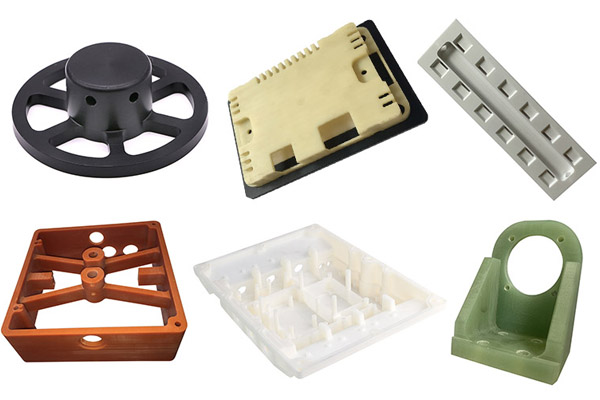
What Plastics are POM Plastics?
Polyoxymethylene (POM) plastics include both homopolymer and copolymer variants. Homopolymer POM (POM-H) consists solely of formaldehyde monomers, while copolymer POM (POM-C) includes comonomers like methyl methacrylate or ethylene oxide. These plastics are known for their high strength, stiffness, and excellent machinability, making them ideal for precision engineering applications.
Is Delrin Stronger Than Nylon?
Yes, Delrin generally exhibits higher tensile strength, stiffness, and lower moisture absorption compared to Nylon. This makes Delrin a more suitable choice for applications requiring greater mechanical performance and dimensional stability, whereas Nylon is preferred for its flexibility and impact resistance.
What is the Strongest Type of Plastic?
Polycarbonate and PEEK (Polyether Ether Ketone) are among the strongest engineering plastics. PEEK, in particular, offers exceptional mechanical properties, high temperature resistance, and excellent chemical resistance, making it suitable for the most demanding applications.
Is Delrin Better Than Acetron GP?
Delrin is a specific grade of Acetal with enhanced properties such as higher strength, stiffness, and chemical resistance. While Acetron GP is a general-purpose Acetal copolymer, Delrin offers superior performance in applications requiring greater durability and precision, making it a better choice for high-performance CNC machining parts.
What is Another Name for Polyoxymethylene?
Another common name for Polyoxymethylene is Acetal, which refers to the class of polymers within the POM family. Delrin is a well-known brand name for a specific grade of Acetal developed by DuPont.
What are the Alternatives to Polyoxymethylene?
Alternatives to Polyoxymethylene include Nylon (Polyamide), PEEK (Polyether Ether Ketone), PET (Polyethylene Terephthalate), and polypropylene. Each alternative offers different properties and may be more suitable depending on the specific requirements of the application.
Is Polyoxymethylene a Hard Plastic or a Soft Plastic?
Polyoxymethylene is considered a hard plastic due to its high stiffness, strength, and low flexibility. It is used in applications requiring rigid and durable components that maintain their shape and dimensional stability under stress.
